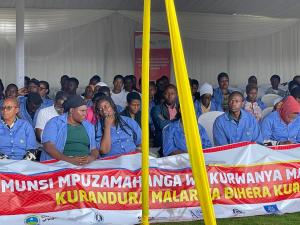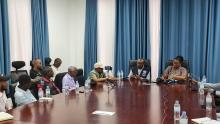Advancing the Fight against Malaria: Rwanda's Bold Steps on World Malaria Day
Kigali — Rwanda joined the global community in celebrating World Malaria Day in the Ndera sector of Gasabo district, in line with this year's global theme, "Malaria Ends with Us: Reinvest, Reimagine, Reignite". This significant event aimed at raising awareness about malaria prevention, control and treatment, highlighting Rwanda's ongoing efforts to combat this deadly disease.
Malaria, a preventable and treatable disease, continues to be a public health problem in Rwanda and globally, impacting many lives. It remains one of the leading causes of morbidity and mortality in Rwanda.
Despite numerous challenges, Rwanda is making substantial progress in the fight against malaria. The country has significantly reduced malaria transmission, with the incidence dropping by 86% from 409 cases per 1,000 persons per year in 2016/2017 to 47 cases per 1,000 persons per year in 2022/2023.
In the lead-up to World Malaria Day, Rwanda organized a media tour in the Nyagatare and Gisagara districts from 21 to 24 April 2025 to showcase community efforts in actively combating malaria. The tour also provided a platform for sharing best practices.
With technical and financial support from WHO, the Global Fund to Fight AIDS, Tuberculosis and Malaria, the President's Malaria Initiative (PMI) and other partners, the Ministry of Healthhas led the fight against malaria from the front.
The country has prioritized strengthening health systems, including building the capacity of community and healthcare workers, bolstering the frontline response to malaria and fostering resilience amid the evolving geopolitical and financial challenges. Rwanda has expanded community-based health programs and improved access to treatment and preventive measures like Long-Lasting Insecticide-Treated Nets (LLINS). The country has accessed and distributed 6,075,797 LLINS, achieving universal coverage of insecticide-treated nets. It has reached a historical milestone with 71% coverage in a single LLINS distribution cycle.
A notable best practice in the malaria programme is the National Community-Based Malaria Surveillance, recently launched in Kigali. This initiative screened and treated all household members from index cases within 15 sectors for Malaria.
“Thanks to that programme, we identified 769 index cases. We then tested 2326 family members and found 626 linked cases that we would have otherwise missed,” said Prof Claude Mambo Muvunyi, Director General of Rwanda Biomedical Centre.
Prof Muvunyi urged every citizen to take an active role in the fight against malaria by eliminating breeding grounds around homes and adhering to proper medication usage are essential. He also called upon all stakeholders and institutions to join forces in prevention and early detection.
WHO Representative to Rwanda, Dr Brian Chirombo, emphasized the need for stronger collaboration among stakeholders for the country to continue the trajectory towards malaria elimination. “WHO is committed to continue working with partners in supporting the Ministry of Health in the fight against malaria. We call for increased domestic resource allocation and continued donor support to accelerate progress towards malaria elimination. We also urge all stakeholders to redouble their efforts in supporting government in this critical fight to save lives and build a healthier future for Rwanda”.
Call to Action:
While Rwanda celebrates its achievements, there is a critical need for sustained investments and innovation in the fight against malaria and the engagement of all stakeholders. The active participation of local communities in malaria prevention and their utilization of available interventions like mosquito nets and healthcare services are essential.
Given the current financial challenges and the vital role of international assistance, Rwanda calls upon development partners and donors to reaffirm their commitment to supporting malaria control initiatives in the country.
Furthermore, understanding the importance of innovation and research, Rwanda continues to advocate for continued investment in studies and surveys to generate knowledge and develop new tools and strategies to combat malaria effectively.
On this World Malaria Day, the government of Rwanda and its partners reaffirm their dedication to eliminating malaria. By enhancing collaboration and strengthening joint efforts, the vision of a malaria-free Rwanda is achievable.
For media inquiries, please contact:
Rwanda Biomedical Centre, Pascal Niyibikora, pascal.niyibikora [at] rbc.gov.rw (pascal[dot]niyibikora[at]rbc[dot]gov[dot]rw)
WHO Rwanda: Jemila M. Ebrahim, ebrahimj [at] who.int (ebrahimj[at]who[dot]int)




